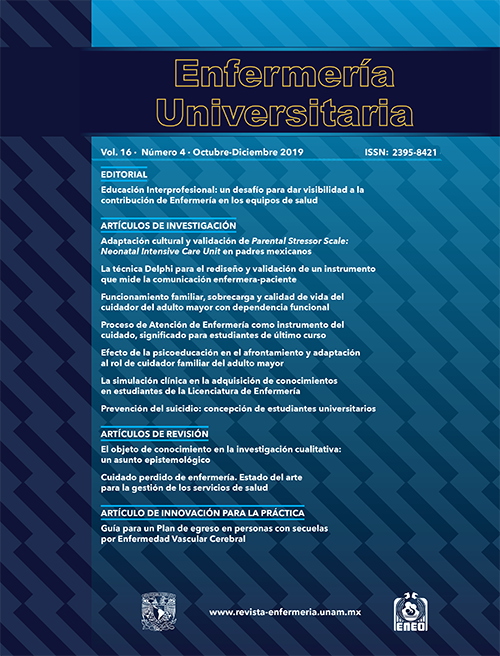The object of knowledge in qualitative research: an epistemological matter
Main Article Content
Abstract
Introduction: Although frequently underestimated, reflexive and interrogative processes needed to develop the research questions in qualitative research can give shape and direction to a study. Good research questions do not necessarily produce a good research study, but badly conceived or elaborated research questions can create problems which will further have impacts on all stages of the study.
Objective: This study addresses the development of research questions and how their generation and refinement processes are fundamental in the conformation of a qualitative study.
Development: Generating relevant and adequate research questions requires the researchers to give attention to the questions and their relations to all the components of the design; in other words, to the objectives, the conceptual framework, the methods used, the possible implications involved, the validity, etcetera. Reflecting on these issues is an useful tool while developing research questions.
Conclusions: In qualitative studies, the ongoing process of questioning is integral to the comprehension of the lives and perspectives of others. So, it is important to emphasize that qualitative research requires the researchers to adopt an epistemological posture by selecting methods and procedures which can support their field work information gathering.
Publication Facts
Reviewer profiles N/A
Author statements
- Academic society
- N/A
- Publisher
- Universidad Nacional Autónoma de México
Article Details
Dimensions citation
MÉTRICAS
References
2. Hamui-Sutton A. La pregunta de investigación en los estudios cualitativos. Investigación educ. médica. 2016; 5(17): 49-54. http://dx.doi.org/10.1016/j.riem.2015.08.008
3. Maxwell JA. Designing a Qualitative Study. En: Hedrick TE, Bickman L, Rog DJ. Applied research designs. A practical guide. London: SAGE; 2008. http://dx.doi.org/10.4135/9781412983457
4. Macfarlane MD, Kisely S, Loi S, Looi JC, Merry S, Parker S, et al. Getting started in research: research questions, supervisors and literature reviews. Australas Psychiatry. 2015; 23(1): 8-11. https://doi.org/10.1177/1039856214553315
5. Denzin NK, Lincoln YS. Manual de investigación cualitativa. Volumen 1. El campo de la investigación cualitativa. Barcelona: Gedisa; 2012.
6. Geertz C. El antropólogo como autor. Barcelona: Paidós; 1989.
7. Hammersley M, Atkinson P. Etnografía. Métodos de investigación. 2da ed. Barcelona: PAIDOS; 1994.
8. Frankel RM, Devers KJ. Study design in qualitative research—1: Developing questions and assessing resource needs. Educ Health. 2000; 13(2): 251–261. https://doi.org/10.1080/13576280050074534
9. Kemparaj U, Chavan S. Qualitative research: a brief description. Indian J Med Sci. 2013; 67(3-4): 89-98. https://doi.org/10.4103/0019-5359.121127
10. Martínez-Miguélez M. Ciencia y arte en la metodología cualitativa. 2da. Edición, México; Trillas. 2015.
11. Hale ED, Treharne GJ, Kitas GD. Qualitative methodologies I: asking research questions with reflexive insight. Musculoskeletal Care. 2007; 5(3): 139-47. https://doi.org/10.1002/msc.109
12. Quiñones M, Supervielle M, Acosta MJ. Introducción a la sociología cualitativa: fundamentos epistemológicos y elementos de diseño y análisis. 2da ed. Uruguay: Unidad de comunicación de la universidad de la república-Ucur; 2017.
13. Klopper H. The qualitative research proposal. Curationis. 2008; 31(4): 62-72. https://bit.ly/30CgiU0
14. Martínez C, Otálvaro JC, Jáider C. La elección de la postura epistemológica del investigador y sus consecuencias metodológicas, éticas y prácticas. Revista Facultad Nacional de Salud Pública. 2015; 33(supl 1): S81-3. https://doi.org/10.17533/udea.rfnsp.v33s1a13
15. Quintana A, Montgomery W. Psicología: tópicos de actualidad. Lima: UNMSM; 2006.
16. Koro-Ljungberg M, Hayes S. Proposing an argument for research questions that could create permeable boundaries within qualitative research. J Ethnogr Qual Res. 2010 4(3): 114-24. https://bit.ly/2ZuWgxi
17. Malterud K. Theory and interpretation in qualitative studies from general practice: Why and how? Scand J Public Health. 2016; 44(2): 120-9. https://doi.org/10.1177/1403494815621181
18. Carter SM, Little M. Justifying knowledge, justifying method, taking action: epistemologies, methodologies, and methods in qualitative research. Qual Health Res. 2007; 17(10): 1316-28. https://doi.org/10.1177/1049732307306927
19. Quecedo R, Castaño C. Introducción a la metodología de investigación cualitativa. Rev psicodidáctica. 2002; (14): 5-39. https://bit.ly/2d51Zh3
20. Agee J. Developing qualitative research questions: a reflective process. Int J Qual Stud Educ. 2009; 22:4, 431-47. https://doi.org/10.1080/09518390902736512
21. Lankshear C; Knobel M. Problemas asociados con la metodología de la investigación cualitativa. Perf. educ. 2000; 22(87): 6-27. https://bit.ly/2LhrbUy
22. Flick U. Introducción a la investigación cualitativa. Madrid: Morata; 2004.
23. Meyrick J. What is good qualitative research? A first step towards a comprehensive approach to judging rigour/quality. J Health Psychol. 2006; 11(5): 799-808. https://doi.org/10.1177/1359105306066643
24. Smythe L, Giddings LS. From experience to definition: addressing the question ‘what is qualitative research?’Nurs Prax N Z. 2007; 23(1): 37-57. https://bit.ly/30DFyJj
25. Sandoval-Casilimas CA. Investigación cualitativa. Bogotá: Instituto Colombiano para el Fomento de la Educación Superior; 1996. https://bit.ly/2ip3fkv

This work is licensed under a Creative Commons Attribution-NonCommercial-NoDerivatives 4.0 International License.
Enfermería Universitaria by Universidad Nacional Autónoma de México it is distributed under the License Creative Commons Attribution - NonCommercial - NoDerivatives 4.0 International
Accepted and published articles become open-access under the terms of the Creative Commons CC BY-NC-ND 4.0 license, which authorizes the reproduction and sharing without commercial purposes, provided the corresponding acknowledgments to their authors. Authors are allowed to manage a self-archive copy of the article’s published version so that they can open-access it in their personal or institutional web pages, and/or any other broad-diffusion space.


